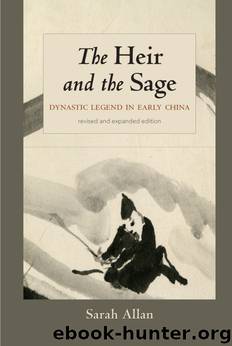The Heir and the Sage, Revised and Expanded Edition: Dynastic Legend in Early China by Sarah Allan

Author:Sarah Allan
Language: eng
Format: epub
Publisher: State University of New York Press
Published: 2016-03-13T16:00:00+00:00
1. For early studies of these figures as legendary, see Gu shi bian, esp. v. 1. The term euhemerized (introduced by Maspero) is somewhat misleading because it implies a historical process by which the mythical figures of Yao, Shun, and Yu came to be regarded as emperors. I would prefer to think of the legend transformations as generated by the virtue-heredity conflict and associated with the folk myths, but not necessarily developed from them. The “noneuhemerized” myths thus continued to exist as long as they were relevant to those conflicts which generated them; they did not become (or develop into) the euhemerized forms. On the other hand, it is interesting to differentiate between those legends with a purely mythological base and no restrictions according to historical reality and those subject to the exigencies of historical times in order to demonstrate the continuity of the structure.
2. Chang, 79, 143. For a discussion of Shang sacrifices to Yi Yin, see also Chen, Yinxu, 361–64; and Shima, 247–52.
3. The importance and power of deceased ministers in Shang sacrifices is also mentioned in Creel, Statecraft, 27. For sacrifices to other ministers besides Yi Yin, see also Chen, Yinxu, 364–66; Shima, 252–57.
4. Zhang, 111–27.
5. A similar passage, but with the list of rebels slightly expanded, occurs in Zhanguo ce 3/3a. Yu rather than Shun is often given as the subjugator of the San Miao, as in Zhanguo ce 7/4a and Mozi 5/11a. These passages also include parallels to the subjugation of Jie and Zhòu by Tang and Wu.
6. Wright, “Sui Yang-ti: Personality and Stereotype.”
7. Mengzi 14/2b (7B.3); Lau, 194. This refers specifically to Wu and Zhou rather than Tang and Jie, but presumably the transformation would be the same in both cases.
8. The Sibu congkan edition gives li 理 for the zhi 治 in this passage (li is the ming 名 of Tang Gaozong 唐高宗), but I have followed Xunzi jijie and Xunzi jianshi, 220, in restoring the zhi.
9. Almost identical passages occur in Mozi 9/2a–b, 8a.
10. Shi ji, juan 88, 2569.
11. Shi ji, juan 2, 88; juan 3, 106.
12. Lüshi chunqiu 16/1a–b; Huainanzi 13/9a–b.
13. Guben zhushu jinian, 15–16; Guo yu 7/2a Jin 1. Min Shan sometimes occurs as Meng 蒙 Shan.
14. Shi ji, juan 61, 2121. (The Lüshi chunqiu 19/2b parallels Wu Guang and Bian Sui with the Farmer of the Stone Door and the Northerner Wu Ze, other rule-refusers during Yao’s reign.
15. The phrase man 漫我以其辱行 appears in the almost identical passage in the Lüshi chunqiu (19/2a) simply as 訽我 “shame me” (though the Lüshi chunqiu jiaoshi revises this on the basis of the Zhuangzi to 訽我以其辱行). This use of man 漫, which I have translated as “taint” (glossed as wu 汙), seems unusual, but it is used in the same sense in a previous passage, Zhuangzi 9/29a and Lüshi chunqiu 19/2b, for the Northerner Wu Ze (see chapter 2).
16. The site of the Zhou River is never identified, and in the Lüshi chunqiu (19/2a) the Ying River 穎水, a tributary of the Huai which enters it in Anhui Province, is substituted.
Download
This site does not store any files on its server. We only index and link to content provided by other sites. Please contact the content providers to delete copyright contents if any and email us, we'll remove relevant links or contents immediately.
| African | Asian |
| Australian & Oceanian | Canadian |
| Caribbean & Latin American | European |
| Jewish | Middle Eastern |
| Russian | United States |
4 3 2 1: A Novel by Paul Auster(12375)
The handmaid's tale by Margaret Atwood(7757)
Giovanni's Room by James Baldwin(7326)
Asking the Right Questions: A Guide to Critical Thinking by M. Neil Browne & Stuart M. Keeley(5759)
Big Magic: Creative Living Beyond Fear by Elizabeth Gilbert(5754)
Ego Is the Enemy by Ryan Holiday(5413)
The Body: A Guide for Occupants by Bill Bryson(5080)
On Writing A Memoir of the Craft by Stephen King(4935)
Ken Follett - World without end by Ken Follett(4723)
Adulting by Kelly Williams Brown(4565)
Bluets by Maggie Nelson(4547)
Eat That Frog! by Brian Tracy(4525)
Guilty Pleasures by Laurell K Hamilton(4439)
The Poetry of Pablo Neruda by Pablo Neruda(4097)
Alive: The Story of the Andes Survivors by Piers Paul Read(4018)
White Noise - A Novel by Don DeLillo(4002)
Fingerprints of the Gods by Graham Hancock(3996)
The Book of Joy by Dalai Lama(3976)
The Bookshop by Penelope Fitzgerald(3844)
